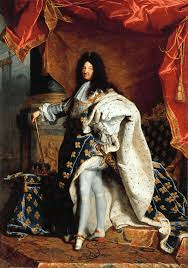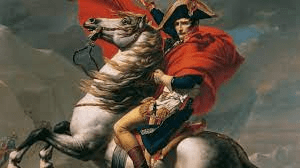False
Describe the Enlightenment time period.
People began to use reason and logic, instead of the teachings from the bible, to question the world around them. Many Enlightenment philosophers argued against absolutism and for equal rights.
Who is this? Why is he an important part of the French Revolution story? 
King Louis XIV, The Sun King
He represented the abuse of the monarchy over the French people
 Who is this and what did he crown himself?
Who is this and what did he crown himself?
Napoleon Bonaparte, Emperor of France
Where did the Industrial Revolution begin? Why?
Great Britain.
Natural resources like coal, iron, and waterways. Capital from its Global Empire. Labor supply due to urbanization.
What is imperialism?
When one country dominates the social, political, and economic life of another.
What is "Divine Right" to rule?
The idea that the right to rule comes from God.
Identify 2 enlightenment thinkers.
Locke, Montesquieu, Rousseau, Voltaire, Wollstonecraft, Wilberforce
What caused the French Revolution?
The Estates System, unfair taxation, famine, inflation, Enlightenment ideals
How did Naopolean seize control over France?
In a coup d'etat
What does urbanization mean?
What is nationalism
Pride and devotion to one's country
What is absolutism?
A type of government in which an absolute ruler (like a monarch) has complete control
Name a revolution that the Enlightenment influenced.
American Revolution
French Revolution
Latin American Revolutions
Haitian Revolution
Explain the Estate System.
The social structure in France tha was made up of three estates- the Clergy, Nobility, and commoners. The Third Estate paid all of the taxes.
Why did the French people support Napoleon?
They hoped he would provide stability after the French Revolution.
Describe the working conditions of factories.
Dangerous, low pay, long hours, unsanitary, use of child labor.
What happened at the Berlin Conference?
A meeting in Germany where European nations mets and agreed to divide up Africa. No African leaders were present.
The fall of what city in 1453 was a major turning point in history because it led to the age of European Exploration?
Constantinople
What are natural rights?
Life, liberty, and property
True or False: The French Revolution was successful at overthrowing an absolute ruler and creating a government for the people.
False
True or False: Napoleon's rule of France led to political stability.
True
How did industrialization lead to imperialism?
European nations desired more profits.
The factory system led to the desire for more markets and more natural resources.
Provide an example of imperialism. (Which country/continent imperialised another?)
Europe - Africa
Great Britain - India
Great Britain - China
What motivated Europeans to explore during the 15th and 16th centuries?
The desire for trade with Asia, the fall of Constantinople and closing of regular trade routes, mercantilism and desire for national wealth
Why is the Enlightenment considered a turning point in world history?
It was a revolution of thought in which people began to question the role of the government and religion which resulted in change. It led others to take action and even revolt against their systems of government.
In which way did the ideas of the Enlightenment influence the French Revolution?
The divine right theory of kings was challenged.
It led to the Congress of Vienna and the restoration of power in Europe and it opened up Europe to the ideas of Nationalism and Enlightenment Ideals
What two economic systems arose from the industrialization of Europe?
Capitalism and Communism
What was the outcome of the Opium Wars in China?
The British won and it began an era of unequal treaties for China in which the British enforced trading and territorial rights within China.